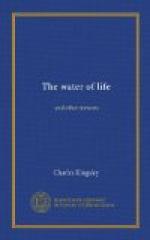But there are those here, I doubt not, who have in them, by grace of God, that same divine thirst for the Higher Life; who are discontented with themselves, ashamed of themselves; who are tormented by longings which they cannot satisfy, instincts which they cannot analyse, powers which they cannot employ, duties which they cannot perform, doctrinal confusions which they cannot unravel; who would welcome any change, even the most tremendous, which would make them nobler, purer, juster, more loving, more useful, more clear-headed and sound-minded; and when they think of death say with the poet, —
’’Tis life, not death for which I pant,
’Tis life, whereof my nerves are scant,
More life, and fuller, that I want.’
To them I say—for God has said it long ago,—Be of good cheer. The calling and gifts of God are without repentance. If you have the divine thirst, it will be surely satisfied. If you long to be better men and women, better men and women you will surely be. Only be true to those higher instincts; only do not learn to despise and quench that divine thirst; only struggle on, in spite of mistakes, of failures, even of sins—for every one of which last your heavenly Father will chastise you, even while He forgives; in spite of all falls, struggle on. Blessed are you that hunger and thirst after righteousness, for you shall be filled. To you—and not in vain— ’The Spirit and the Bride say, Come. And let him that heareth say, Come. And let him that is athirst come. And whosoever will, let him drink of the water of life freely.’
SERMON II. THE PHYSICIAN’S CALLING (Preached at Whitehall for St. George’s Hospital.)
St. Matthew ix. 35.
And Jesus went about all the cities and villages, teaching in their synagogues, and preaching the gospel of the kingdom, and healing every sickness and every disease among the people.
The Gospels speak of disease and death in a very simple and human tone. They regard them in theory, as all are forced to regard them in fact, as sore and sad evils.




